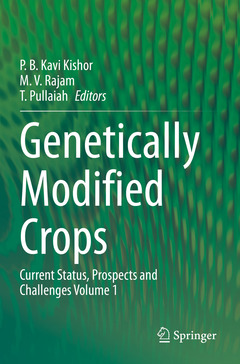Genetically Modified Crops, 1st ed. 2021 Current Status, Prospects and Challenges Volume 1
Coordonnateurs : Kavi Kishor P. B., Rajam Manchikatla Venkat, Pullaiah T.

Genetic transformation is a key technology, in which genes are transferred from one organism to another in order to improve agronomic traits and ultimately help humans. However, there is apprehension in some quarters that genetically modified crops may disturb the ecosystem. A number of non-governmental organizations continue to protest against GM crops and foods, despite the fact that many organisms are genetically modified naturally in the course of evolution. In this context, there is a need to educate the public about the importance of GM crops in terms of food and nutritional security.
Prof. P.B. Kavi Kishor holds a Ph.D. in Botany from Maharaja Sayaji Rao University of Baroda, Vadodara, Gujarat. He was a Visiting Professor at the Biotechnology Center, Ohio State University, Columbus, Ohio, USA, under the Rockefeller Foundation program; Emory University, Atlanta, Georgia, USA; Linkoping University, Sweden; and a Visiting Scientist at the Leibniz Institute of Plant Genetics and Crop Plant Research, Gatersleben, Germany. He has published 255 papers, and edited or written five books. He is a Fellow of the National Academy of Sciences (FNASc), and the National Academy of Agricultural Sciences (FNAAS), and he holds one patent.
Dr. Manchikatla Venkat Rajam is a Professor at the Department of Genetics, University of Delhi South Campus, New Delhi, and has also served as Head of the department. He holds a Ph.D. in Botany from Kakatiya University, Warangal, India, and was a Postdoctoral Fellow at Yale University, New Haven, USA. He also worked as a Visiting Research Associate at Boyce Thompson Institute (BTI), Cornell University, Ithaca, USA. He is a Fellow of the Indian National Science Academy (FNA), National Academy of Sciences, India (FNASc), and National Academy of Agricultural Sciences (FNAAS). He has published 144 papers, and is a co-editor of a two-volume book on plant biology and biotechnology, published in 2015 by Springer India. He holds one Indian patent.
Dr. T. Pullaiah is a former Professor at the Department of Botany at Sri Krishnadevaraya University in Andhra Pradesh, India. He has held several positions at the university, and was President of the Indian Botanical Society, and of the Indian Association for Angiosperm Taxonomy. He holds a PhD from Andhra University, India, and was a Postdoctoral Fellow at Moscow State University, Russia.
He was awarded the Panchanan Maheshwari Gold Medal, the Dr. G. Panigrahi Memorial Lecture award of the Indian Botanical Society, and the Prof. Y.D. Tya
Date de parution : 11-2021
Ouvrage de 265 p.
15.5x23.5 cm
Date de parution : 11-2020
Ouvrage de 265 p.
15.5x23.5 cm



